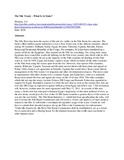| dc.description.abstract | The Nile River has been the source of life and of c
onflict in the Nile Basin for centuries.
The basin’s three million square kilometres cover a
bout 10 per cent of the African continent, shared
among 10 countries: Ethiopia, Sudan, Egypt, Rwanda,
Tanzania, Uganda, Burundi, Eritrea, Kenya and
Democratic Republic of the Congo. For centuries, Ni
le has been considered as a source of life by the
Egyptians. They depend on the Nile for everything.
For a long time, many Egyptians have stated that
would die fighting for the Nile if any country inte
rfered with its flow. This way of life is under thr
eat as
the majority of the Nile countries are battling for
the Nile water as well. In 1959, Egypt and Sudan s
igned
a treaty which excluded all the other countries of
the Nile from using the waters apart from the two.
However, four upriver Nile countries, namely, Ethio
pia, Uganda, Tanzania and Rwanda moved ahead
with their plans and signed on Friday 14th a framew
ork agreement in Entebbe, Uganda that would allow
them a more liberal management of the Nile waters f
or irrigation and other developmental projects. The
move came as negotiations with other stream river c
ountries; Egypt and Sudan have come to a
standstill. Kenya later joined the four and signed
the treaty on the 19
th
may 2010.
The other countries which did not sign the treaty i
nclude: Eritrea, DR Congo and Burundi. Eritrea has
signalled its support for Egypt. Burundi is expecte
d to back the new deal as soon as the current elect
ions
are over and DR Congo is expected to ignore lobbyin
g from Egypt and follow suit.
1
The document, will,
however, remain open for more signatures until May
13, 2011.
As a result of this new treaty, a fresh crisis has
emerged to threaten Egypt’s hegemony of this most
political of river, as the new treaty would give th
e five of the 10 Nile basin countries a greater sha
re of
the waters as was not the case before.
The Nile Basin Initiative
2
, which had been spearheading the talks, will now b
ecome the Nile Basin
Commission and will receive, review and approve or
reject projects related to the Nile. It will furthe
r
coordinate the equitable usage of the water. Countr
ies will have to submit their intended projects alo
ng
the Nile to the Commission for endorsement. "Under
the framework, the River Nile Basin Commission
shall be established to act as a forum for co-opera
tion and a clearing house for the planned measures
that could cause any harm to other riparian states | en |

